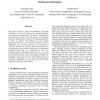Free Online Productivity Tools
i2Speak
i2Symbol
i2OCR
iTex2Img
iWeb2Print
iWeb2Shot
i2Type
iPdf2Split
iPdf2Merge
i2Bopomofo
i2Arabic
i2Style
i2Image
i2PDF
iLatex2Rtf
Sci2ools
122
Voted
ATAL
2004
Springer
2004
Springer
Automated Multi-Attribute Negotiation with Efficient Use of Incomplete Preference Information
This paper presents a model for integrative, one-to-one negotiation in which the values across multiple attributes are negotiated simultaneously. We model a mechanism in which agents are able to use any amount of incomplete preference information revealed by the negotiation partner in order to improve the efficiency of the reached agreements. Moreover, we show that the outcome of such a negotiation can be further improved by incorporating a "guessing" heuristic, by which an agent uses the history of the opponent’s bids to predict his preferences. Experimental evaluation shows that the combination of these two strategies leads to agreement points close to or on the Pareto-efficient frontier. The main original contribution of this paper is that it shows that it is possible for parties in a cooperative negotiation to reveal only a limited amount of preference information to each other, but still obtain significant joint gains in the outcome.
| Added | 30 Jun 2010 |
| Updated | 30 Jun 2010 |
| Type | Conference |
| Year | 2004 |
| Where | ATAL |
| Authors | Catholijn M. Jonker, Valentin Robu |
Comments (0)

